Mechanisms of oncogenesis - Study guides, Class notes & Summaries
Looking for the best study guides, study notes and summaries about Mechanisms of oncogenesis? On this page you'll find 17 study documents about Mechanisms of oncogenesis.
All 17 results
Sort by
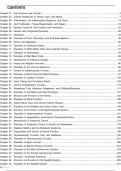 Popular
Popular
-
TEST BANK ESSENTIALS OF PATHOPHYSIOLOGY (4TH EDITION BY PORTH)
- Exam (elaborations) • 263 pages • 2024
-
- $15.49
- 2x sold
- + learn more
TEST BANK ESSENTIALS OF PATHOPHYSIOLOGY (4TH EDITION BY PORTH) CONTENTS Chapter 01 - Cell Structure and Function .......................................................................................................................... 2 Chapter 02 - Cellular Responses to Stress, Injury, and Aging .......................................................................................... 7 Chapter 03 - Inflammation, the Inflammatory Response, and Fever ..............................................
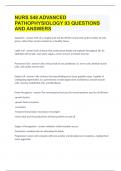
-
NURS 548 ADVANCED PATHOPHYSIOLOGY |93 QUESTIONS AND ANSWERS.
- Exam (elaborations) • 14 pages • 2023
- Available in package deal
-
- $14.49
- + learn more
Apoptosis Cells of a neoplasm do not die off like normal cells so the number of cells grows, rather than remain constant as in healthy tissue. Labile Cell Cells of tissue that continuously divide and replicate throughout life. Ex: epithelial cells of skin, oral cavity, vagina, cervix, GI tract, and bone marrow. Permanent Cell Cells of tissue that do not proliferate. Ex: nerve cells, skeletal muscle cells, and cardiac muscle cells. Stable Cell Cells of tissue that stop di...
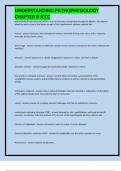
-
Understanding Pathophysiology Chapter 8 JCCC
- Exam (elaborations) • 15 pages • 2024
-
- $12.99
- + learn more
Tumors - answer-abnormal swelling or cell growth Incidence - answer-a measure of the probability of occurrence of a given medical condition in a population within a specified period of time Prevalence - answer-the proportion of individuals in a population having a disease or characteristic. Endemic - answer-growing or existing in a certain place or region Epidemic - answer-spreading rapidly and extensively by infection and affecting many individuals in an area or a population at the ...
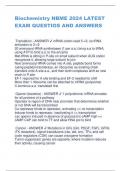
-
Biochemistry NBME 2024 LATEST EXAM QUESTIOS AND ANSWERS
- Exam (elaborations) • 23 pages • 2024
- Available in package deal
-
- $9.49
- + learn more
Biochemistry NBME 2024 LATEST EXAM QUESTIOS AND ANSWERS Translation - ANSWER mRNA codon read 5->3, so tRNA anticodon is 3->5 20 aminoacyl-tRNA synthetases (1 per a.a.) bring a.a to tRNA, using ATP to bind a.a. to the enzyme Met-tRNA is sitting in P-site on small subunit when AUG codon recognizes it, allowing large subunit to join Next aminoacyl-tRNA comes into A site, peptide bond forms (using peptidyl transferase, an ribozyme) as existing chain transfers onto A s...
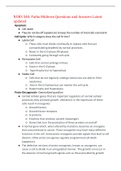
-
NURS 548: Patho Midterm Questions and Answers Latest updated,100% CORRECT
- Exam (elaborations) • 26 pages • 2022
-
- $16.99
- + learn more
NURS 548: Patho Midterm Questions and Answers Latest updated Apoptosis ● Cell death ● They do not die off (apoptosis) to keep the number of total cells consistent Cell Cycle- Which category does the cell fit into? ● Labile Cell ○ These cells must divide continually to replace cells that are constantly being depleted by normal processes. ○ Never in the G-0 phase (M-phase). ○ Constantly going through cell cycle ● Permanent Cell ○ Cells that cannot undergo mitosis. ○ St...
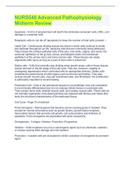
-
NURS548 Advanced Pathophysiology Midterm Review 2022/2023
- Exam (elaborations) • 10 pages • 2022
-
- $10.29
- + learn more
Apoptosis A form of programmed cell death that eliminates senescent cells, DNA,, and damage or unwanted cells. Neoplastic cells do not die off (apoptosis) to keep the number of total cells constant. ... Labile Cell Continuously dividing tissues are those in which cells continue to divide and replicate throughout our life, replacing cells that are continually being destroyed. They include the surface epithelial cells of the skin, oral cavity, vagina, and cervix; the columnar epit...
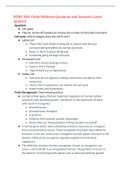
-
NURS 548: Patho Midterm Questions and Answers Latest updated,100% CORRECT
- Exam (elaborations) • 26 pages • 2022
-
- $16.99
- + learn more
NURS 548: Patho Midterm Questions and Answers Latest updated Apoptosis ● Cell death ● They do not die off (apoptosis) to keep the number of total cells consistent Cell Cycle- Which category does the cell fit into? ● Labile Cell ○ These cells must divide continually to replace cells that are constantly being depleted by normal processes. ○ Never in the G-0 phase (M-phase). ○ Constantly going through cell cycle ● Permanent Cell ○ Cells that cannot undergo mitosis. ○ St...
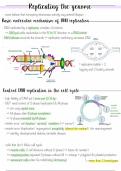
-
GEN 6: Replicating the Genome
- Class notes • 7 pages • 2023
- Available in package deal
-
- $10.37
- + learn more
Lecture notes from Imperial College London, Medical Biosciences BSc, 2nd year, genetics and genomics (GEN) module. Focus on replication of the genome. Before a cell divides, the entire genome of 3 billion base pairs must first be copied: accurately, quickly and just once per cell cycle. During this replication, chromosomal DNA must be unwound without getting tangled or suffering breakages and, if damage occurs, it must be repaired. Failure to meet any of these requirements may result in damag...
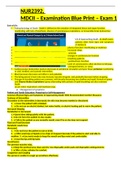
-
NUR2392, MDCII – Examination Blue Print – Exam 1
- Exam (elaborations) • 53 pages • 2022
-
- $15.49
- + learn more
NUR2392, MDCII – Examination Blue Print – Exam 1 End-of-Life • Pathophysiology of Death- Death is defined as the cessation of integrated tissue and organ function, manifesting with lack of heartbeat, absence of spontaneous respirations, or irreversible brain dysfunction. S/S of Approaching death- As death nears, patients often have signs and symptoms of decline in • physical function- manifesting as weakness • increased sleep. • anorexia • changes in cardiovascular fu...
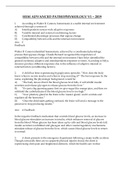
-
HESI ADVANCED PATHOPHYSIOLOGY V1 – 2019
- Exam (elaborations) • 49 pages • 2022
-
- $14.99
- + learn more
HESI ADVANCED PATHOPHYSIOLOGY V1 – 2019 1. According to Walter B. Cannon, homeostasis is a stable internal environment achieved through a system of: A) Interdependent system-wide adaptive responses B) Variable internal and external conditioning factors C) Coordinated physiologic processes that oppose change D) Compatibility between cells and the internal environment Ans: C Feedback: Walter B. Cannon identified homeostasis, achieved by a coordinated physiologic process that opposes ch...

How did he do that? By selling his study resources on Stuvia. Try it yourself! Discover all about earning on Stuvia


